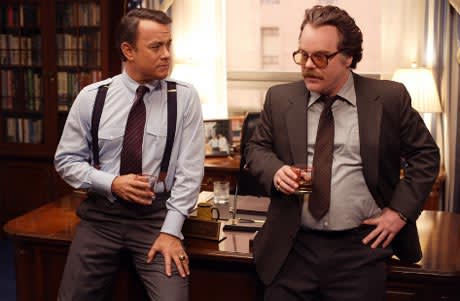A more cruel and treacherous war can be found in Mike Nichols last outing, the four-way relationship drama Closer. Charlie Wilsons War, on the other hand, a sprightly and polished comedic satire that depicts the covert backroom shenanigans behind the Soviet-Afghan war, goes down as smooth as a martini and is just about as intoxicating.
Tom Hanks is in his element as the fun-loving, freewheeling, titular congressman, a hound dog in expensive threads who managed to secretly supply the Mujahideen with over $1 billions worth of weapons to repel a Soviet invasion. For Wilson, who is as sincerely (it seems) concerned about foreign politics as he is his interns bust, the feat was simply a matter of having a few drinks with the right people.
Leading him on is ultra-conservative, threateningly Christian Houston socialite Joanne Herring (Julia Roberts), a bed mate for Charlie both literally and politically, often at the same time. While Herring gets Charlies mojo running, its the working relationship with gruff CIA agent Gust Avrakotos that steals the show.
Philip Seymour Hoffman is his award-worthy self as Gust, an underappreciated, foulmouthed spy who has the best solutions but the most inappropriate way of putting them into words a fitting foil to Wilsons verbal masseuse. The farcical sparring between Wilson and Gust on their first meeting for which Aaron Sorkins sharp screenplay provides a bounty of zingers is testament to how fruitful this off-kilter partnership really is. "You aint James Bond, observes Wilson, to which Gust retorts: "You aint Thomas Jefferson, so lets call it even.
Always most comfortable with the fireworks that take place behind closed doors and in private spaces, Nichols shoots straight through this effort with admirable focus on such wheeling and dealings, which keeps the film at an efficient running time of 97 minutes but at the same time, makes us wonder if were losing anything in the peripheral vision. Still, we can be relieved that the director leaves out the obtuse moralising or overstatements that have become a recent trend in films that deal with current politics.
Nichols has faith that the audience already realises the endgame of this story none other than Osama Bin Laden and doesnt feel the need to hammer home the connections. Instead, the director keeps the foreboding to slight remarks and a passing image a fallen helicopter produces a dust cloud that envelops an alley.
Leaving the gloomy observations for later, the current agenda is to just get drunk and giddy on politics.
(Universal)Tom Hanks is in his element as the fun-loving, freewheeling, titular congressman, a hound dog in expensive threads who managed to secretly supply the Mujahideen with over $1 billions worth of weapons to repel a Soviet invasion. For Wilson, who is as sincerely (it seems) concerned about foreign politics as he is his interns bust, the feat was simply a matter of having a few drinks with the right people.
Leading him on is ultra-conservative, threateningly Christian Houston socialite Joanne Herring (Julia Roberts), a bed mate for Charlie both literally and politically, often at the same time. While Herring gets Charlies mojo running, its the working relationship with gruff CIA agent Gust Avrakotos that steals the show.
Philip Seymour Hoffman is his award-worthy self as Gust, an underappreciated, foulmouthed spy who has the best solutions but the most inappropriate way of putting them into words a fitting foil to Wilsons verbal masseuse. The farcical sparring between Wilson and Gust on their first meeting for which Aaron Sorkins sharp screenplay provides a bounty of zingers is testament to how fruitful this off-kilter partnership really is. "You aint James Bond, observes Wilson, to which Gust retorts: "You aint Thomas Jefferson, so lets call it even.
Always most comfortable with the fireworks that take place behind closed doors and in private spaces, Nichols shoots straight through this effort with admirable focus on such wheeling and dealings, which keeps the film at an efficient running time of 97 minutes but at the same time, makes us wonder if were losing anything in the peripheral vision. Still, we can be relieved that the director leaves out the obtuse moralising or overstatements that have become a recent trend in films that deal with current politics.
Nichols has faith that the audience already realises the endgame of this story none other than Osama Bin Laden and doesnt feel the need to hammer home the connections. Instead, the director keeps the foreboding to slight remarks and a passing image a fallen helicopter produces a dust cloud that envelops an alley.
Leaving the gloomy observations for later, the current agenda is to just get drunk and giddy on politics.
